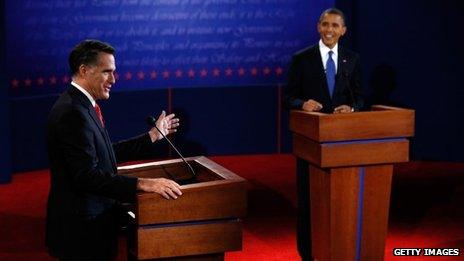Election debates must 'help' voters says US organiser
- Published

About 67 million people watched the first presidential debate of the 2012 campaign
Election debates should help people in deciding how to vote without necessarily "changing minds", the head of the organisation which organises US presidential debates has told peers.
Janet Brown said debates must have "educational value" as well as being a major television news event.
She suggested the format had prospered in the US partly because of the involvement of a "neutral broker".
Leaders' debates were held for the first time in the UK in 2010.
David Cameron, Nick Clegg and Ed Miliband have all said they would like debates to be a feature of next year's election campaign and discussions are taking place between the three largest parties and the BBC, ITV and Sky News - who broadcast the three debates in 2010.
Giving evidence to the Lords Communications Committee, Ms Brown - director of the Commission on US Presidential Debates - said there was an "expectation" among the US public that the encounters would be held every four years.
'Just like 1961'
Although the first debate was staged in 1960 and they have been running continuously since 1976, she said that did not mean the process was free from political machinations.
"If someone can find a reason to minimise the number of debates and their value because it suits their interests, that is what they will try to do," she said.
"It is the commission's job to protect that tradition and to make sure the format is progressively refined every cycle."
The Commission, a private company, has been running the debates since 1987 - selecting the candidates, venues, formats and moderators, although the TV networks have discretion over how the live programmes are broadcast.
Asked by Lib Dem peer Lord Razzall whether this model could work in the UK, given the differences in broadcasting regulations, Ms Brown said she was not "qualified" to say but suggested there was "much to commend having an objective, neutral, independent, debate-sponsoring organisation".
To be taken seriously by the public, she said the debates must be professionally produced, serious and substantial in their content and scrupulously fair to all the participants.
Audience numbers
Ms Brown said the success of election debates should be judged not only on how many people watch them but what impact they have on people's voting intentions.
The first debate in 2012, between Barack Obama and Mitt Romney, was watched by 67 million people, compared with an audience of 52 million for the respective encounter between Mr Obama and John McCain in 2008.
Ms Brown said the audience for the most popular debates was "second only to the Super Bowl" while the number of people citing the debates as being the most important factor in their voting choices rose every year.
"That is not to say they change minds but that people say they find them extremely helpful when they consider how to vote," she added.
The three UK debates in 2010 had a total TV audience of 22 million while the three broadcasters say they were successful in increasing engagement among voters, including younger voters.
But Lord Razzall said the UK was currently in a "1961 situation" as it was unclear whether the debates would happen again or whether they would prove to be a one-off.
The prime minister has suggested the format should be altered, with some of the debates taking place before the start of the official five-week campaign while UKIP leader Nigel Farage is pressing to be included in the panel.
- Published11 February 2014
- Published6 January 2014